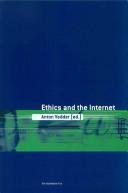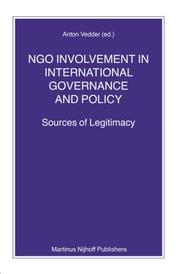| Listing 1 - 10 of 65 | << page >> |
Sort by
|

ISBN: 9050951767 Year: 2001 Publisher: Antwerpen Intersentia
Abstract | Keywords | Export | Availability | Bookmark
 Loading...
Loading...Choose an application
- Reference Manager
- EndNote
- RefWorks (Direct export to RefWorks)
Computer. Automation --- General ethics --- Ethiek --- Ethique --- Internet --- 026.068 --- 241.66*2 --- #A0111A --- #KVHA:Informatica --- #KVHA:Internet --- #KVHA:Ethiek --- Computers and civilization --- 691 Internet --- Civilization and computers --- Civilization --- Theologische ethiek: informatie; media --- Software, programmatuur. Elektronische informatiebronnen. Digitale bibliotheken. Virtuele bibliotheken --- Moral and ethical aspects. --- 026.068 Software, programmatuur. Elektronische informatiebronnen. Digitale bibliotheken. Virtuele bibliotheken --- 241.66*2 Theologische ethiek: informatie; media --- Moral and ethical aspects

ISBN: 9789004158467 9004158464 9786611921743 1281921742 9047422430 9789047422433 9781281921741 6611921745 Year: 2007 Volume: 72 Publisher: Leiden Boston Martinus Nijhoff Publishers
Abstract | Keywords | Export | Availability | Bookmark
 Loading...
Loading...Choose an application
- Reference Manager
- EndNote
- RefWorks (Direct export to RefWorks)
Internationally operating nongovernmental organisations, NGOs, are increasingly involved in international politics and policy making. In many respects their involvement resembles activities and policies that, until recently, were typical of traditional national authorities. This book is about the reasons for which NGOs can and the reasons for which NGOs cannot be considered as rightful participants in international governance. It tries to deliver rationally defensible starting points for the discussion and the assessment of claims for the legitimacy of their organizations and activities. The book focuses on the question: What conditions must ideally be met for an organization to be called truthfully legitimate, be it or be it not as a matter of fact perceived as legitimate by the public? This does not mean that empirically descriptive questions are left aside. Practical feasibility is important even to a thoroughly normative conception of legitimacy. For that reason and for heuristic purposes, large parts of this book are dedicated to the ways in which NGOs and stakeholders perceive NGO legitimacy.
Non-governmental organizations --- International organization --- Social advocacy --- Social justice --- International agencies --- International law --- Organisations internationales --- Organisations non-gouvernementales --- Droit international --- Non-governmental organizations. --- International organization. --- Social advocacy. --- Social justice. --- Equality --- Justice --- Advocacy, Social --- Social service advocacy --- Social work advocacy --- Social service --- Federation, International --- Global governance --- Interdependence of nations --- International administration --- International federation --- Organization, International --- World federation --- World government --- World order --- World organization --- Congresses and conventions --- International relations --- Peace --- Political science --- International cooperation --- Security, International --- World politics --- INGOs (International agencies) --- International non-governmental organizations --- NGOs (International agencies) --- Nongovernmental organizations --- Organizations, Non-governmental (International agencies) --- Private and voluntary organizations (International agencies) --- PVOs (International agencies) --- Nonprofit organizations
Periodical
ISBN: 9789400010185 Year: 2018 Publisher: Mortsel Intersentia
Abstract | Keywords | Export | Availability | Bookmark
 Loading...
Loading...Choose an application
- Reference Manager
- EndNote
- RefWorks (Direct export to RefWorks)
Book
ISBN: 9039308500 Year: 1995 Publisher: Utrecht Universiteit Utrecht. Faculteit der Godgeleerdheid
Abstract | Keywords | Export | Availability | Bookmark
 Loading...
Loading...Choose an application
- Reference Manager
- EndNote
- RefWorks (Direct export to RefWorks)
Book
ISBN: 9781780688893 178068889X 1780688903 Year: 2019 Volume: 7 Publisher: Intersentia
Abstract | Keywords | Export | Availability | Bookmark
 Loading...
Loading...Choose an application
- Reference Manager
- EndNote
- RefWorks (Direct export to RefWorks)
Security and law against the backdrop of technological development. Few people doubt the importance of the security of a state, its society and its organizations, institutions and individuals, as an unconditional basis for personal and societal flourishing. Equally, few people would deny being concerned by the often occurring conflicts between security and other values and fundamental freedoms and rights, such as individual autonomy or privacy for example. While the search for a balance between these public values is far from new, ICT and data-driven technologies have undoubtedly given it a new impulse. These technologies have a complicated and multifarious relationship with security. This book combines theoretical discussions of the concepts at stake and case studies following the relevant developments of ICT and data-driven technologies. Part I sets the scene by considering definitions of security. Part II questions whether and, if so, to what extent the law has been able to regulate the use of ICT and data-driven technologies as a means to maintain, protect or raise security, in search of a balance between security and other public values, such as privacy and equality. Part III investigates the regulatory means that can be leveraged by the law-maker in attempts to secure products, organizations or entities in a technological and multiactor environment. Lastly, Part IV, discusses typical international and national aspects of ICT, security and the law.
veiligheid --- sécurité --- Sécurité. --- Sécurité nationale --- Cyberdéfense --- Sûreté de l'État. --- Human rights --- Droits de l'homme (Droit international) --- Internal security --- Sûreté de l'Etat --- Public safety --- Sécurité publique --- Computer security --- Sécurité informatique --- Computer networks --- Réseaux d'ordinateurs --- Law and legislation --- Droit --- Security measures --- Sécurité --- Mesures
Multi
ISBN: 9781780688893 9781780688909 Year: 2019 Publisher: Cambridge Intersentia
Abstract | Keywords | Export | Availability | Bookmark
 Loading...
Loading...Choose an application
- Reference Manager
- EndNote
- RefWorks (Direct export to RefWorks)
General ethics --- Human rights --- Industrial and intellectual property --- Computer. Automation
Periodical
ISBN: 9781780688893 Year: 2019 Publisher: Mortsel Intersentia
Abstract | Keywords | Export | Availability | Bookmark
 Loading...
Loading...Choose an application
- Reference Manager
- EndNote
- RefWorks (Direct export to RefWorks)
Book
ISBN: 9058500373 Year: 2003 Publisher: Nijmegen Wolf legal publishers
Abstract | Keywords | Export | Availability | Bookmark
 Loading...
Loading...Choose an application
- Reference Manager
- EndNote
- RefWorks (Direct export to RefWorks)
Book
ISBN: 9789054548263 Year: 2008 Publisher: Den Haag Boom Juridische Uitgevers
Abstract | Keywords | Export | Availability | Bookmark
 Loading...
Loading...Choose an application
- Reference Manager
- EndNote
- RefWorks (Direct export to RefWorks)
Information technology --- Technology and law. --- Law and legislation.
Dissertation
Year: 2023
Abstract | Keywords | Export | Availability | Bookmark
 Loading...
Loading...Choose an application
- Reference Manager
- EndNote
- RefWorks (Direct export to RefWorks)
| Listing 1 - 10 of 65 | << page >> |
Sort by
|

 Search
Search Feedback
Feedback About UniCat
About UniCat  Help
Help News
News